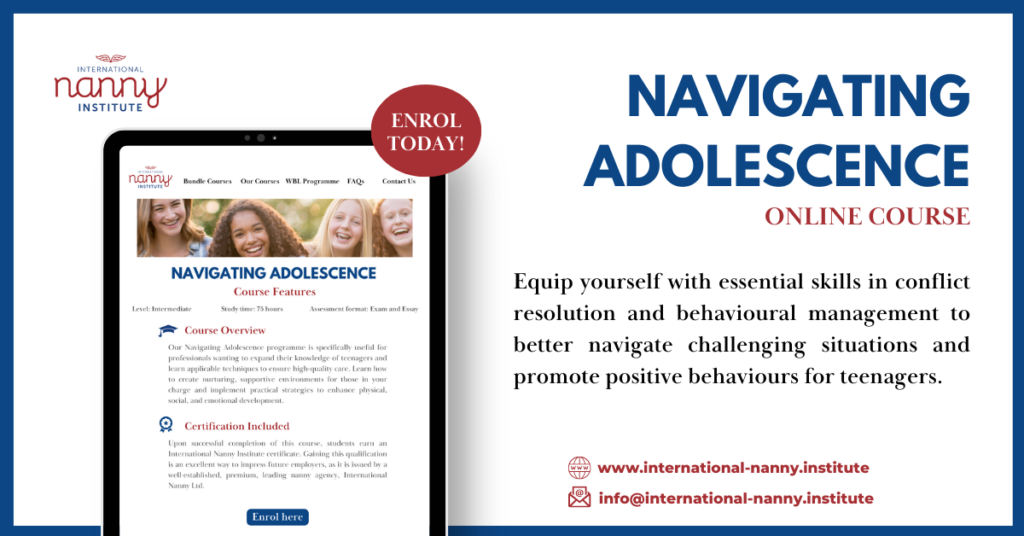As nannies, one of our most important roles is to help the children in our care develop the skills and confidence they need to navigate the world independently. This is perhaps nowhere more crucial than when working with adolescents.

The teenage years are a critical time of transition, as young people begin to stretch their wings and assert their growing autonomy. Caregivers have a unique opportunity to thoughtfully guide this process, empowering young people to take on more responsibility and make their own informed choices.
The Benefits of Fostering Independence
Encouraging independence in adolescents brings a host of benefits, both for the teens themselves and for the nannies supporting them:
Builds Confidence and Self-Esteem
When teens are given the chance to take the lead and problem-solve on their own, it nurtures a greater sense of self-efficacy and personal agency. This boosts their confidence and self-assurance as they prepare for adulthood.
Develops Critical Thinking Skills
By prompting adolescents to analyse challenges, consider options, and make decisions, we help hone their critical thinking and decision-making abilities. These are crucial life skills that will serve them well in the years to come.

Fosters Responsibility and Accountability
As nannies gradually transfer tasks and choices to the teens in our care, we instil a greater sense of ownership and accountability. Adolescents learn to take responsibility for their actions and commitments.
Strengthens the Nanny-Teen Relationship
Paradoxically, empowering adolescents to be more independent can actually deepen our relationship with them. It demonstrates trust, respect, and a belief in their capabilities.
Prepares Teens for Adulthood
Perhaps most importantly, nurturing independence in our adolescent clients equips them with the autonomy, resilience, and self-reliance they’ll need to successfully navigate the transition to young adulthood.

Strategies for Fostering Independence
Here are some key strategies for fostering independence in the teens you work with:
- Gradually Shift Responsibilities
Rather than abruptly handing over all decision-making and tasks, work incrementally to transfer ownership to the adolescent. Maybe start by having them plan their own weekly schedule, then progress to managing their own homework and chores. This gradual release of control allows them to build competence at their own pace.
- Encourage Problem-Solving
When challenges arise, resist the impulse to immediately jump in and fix things. Instead, prompt the teen to think through the issue, brainstorm potential solutions, and determine the best course of action. Offer guidance, but let them take the lead. This nurtures their critical thinking and resilience.
- Foster Self-Advocacy
Teach adolescents how to effectively communicate their needs, preferences, and concerns. Role-play different scenarios, like speaking up at school or negotiating with their parents. Empower them to be their own best advocate.

- Provide Scaffolding
Even as we encourage independence, it’s important to maintain a supportive safety net. Offer a structured decision-making framework, thought-provoking questions, and gentle nudges when needed. This “scaffolding” gradually recedes as the teen gains confidence.
- Celebrate Small Wins
Recognise and affirm every step the adolescent takes toward greater autonomy. Whether it’s completing a chore without a reminder or navigating a social situation independently, make sure to provide positive feedback. This reinforces their progress.
- Respect Boundaries
As teens become more independent, it’s crucial that we respect their growing need for privacy and space. Avoid overbearing monitoring or excessive intervention, unless there are clear safety concerns.

The path to independence isn’t always linear – there may be setbacks and struggles along the way, but by striking the right balance between support and autonomy, we can help the adolescents in our care develop the skills, maturity, and self-assurance they need to thrive. Fostering independence is one of the most rewarding and lasting gifts we can give. As nannies, we play a pivotal role in empowering the next generation to lead fulfilling, self-directed lives.
Navigating the teenage years can be complex, but with the right knowledge and skills, you can make an immeasurable difference in the lives of young people. The International Nanny Institute’s “Navigating Adolescence” course will provide you with a deep understanding of the unique social, emotional, and developmental needs of teens. Armed with this expertise, you’ll be empowered to establish healthy boundaries, facilitate independence, and guide adolescents through the challenges they face. Families will recognise you as an indispensable, specialised caregiver – opening doors to more fulfilling work and higher earning potential.














